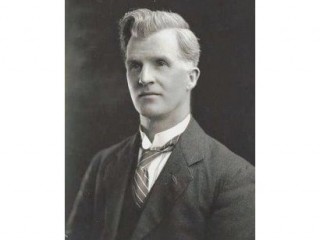
James Henry Scullin biography
Date of birth : 1876-09-18
Date of death : 1953-01-28
Birthplace : Trawalla, Victoria, Australia
Nationality : Australian
Category : Politics
Last modified : 2011-07-13
Credited as : Politician, former Prime Minister of Australia,
James Scullin was born the son of a railway worker near Ballarat, Victoria. He was brought up a Roman Catholic and formally educated only at primary school, but he later attended evening classes. He became a small grocer and editor of a newspaper in Ballarat before turning his attention to politics.
Scullin joined the Labour party in 1903 and was organizer for the Australian Workers Union for 4 years until, in 1910, he was elected to the federal Parliament. He lost his seat in 1913 and became editor of the Ballarat Echo, an evening daily. He returned to Parliament in 1923 and became deputy leader of the Labour party in 1927 and leader the following year. In the election of October 1929 he decisively defeated the governing Liberal and Country parties, and the Labour party gained its largest parliamentary majority since the federation in 1901.
Scullin lacked ministerial experience when he became prime minister, and though he was a man of moderate views and was respected on all sides for his integrity, his modesty and gentleness ill matched the heavy burdens that were to fall on his shoulders. As the effects of the worldwide economic depression spread to Australia, his ministry was torn by internal dissension. His task was made more difficult by a hostile upper house, where, in contrast to its large majority in the lower house, the Labour party held only 7 of the 36 seats and was thus powerless to put several of its proposals into effect.
Because of the economic crisis, Scullin's government was obliged to repudiate election pledges and to assume responsibility for deflation, retrenchment, reduction in wages and the standard of living, and, at the end of 1931, a devaluation of the Australian pound in terms of sterling. Throughout his tenure of office Scullin was harassed by political difficulties arising out of his government's management of the economic crisis.
In August 1930 Scullin left to attend the imperial conference in London, where one of his duties was to advise the King that, in accordance with Labour party views in Australia, the next governor general should be an Australian. In his absence, his parliamentary following split on economic policy, and when he returned, there was outright defection. Five members from New South Wales left the federal Labour party and formed themselves into a group attached to the policies of John Thomas Lang, the controversial Labour premier in their state; and Joseph Lyons, the postmaster general, resigned from the ministry and joined the opposition. In the election of December 1931 the opposition was led by Lyons and supported by some other erstwhile members of the Labour party.
The crippled Labour government was swept from office, and Scullin was replaced as prime minister by his former lieutenant. He continued as leader of the Labour party until 1935, when he resigned on account of ill health. He remained in Parliament until 1949 and died on Jan. 28, 1953.
















